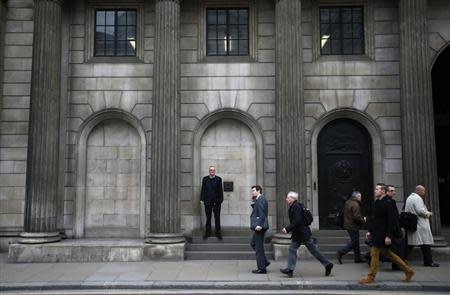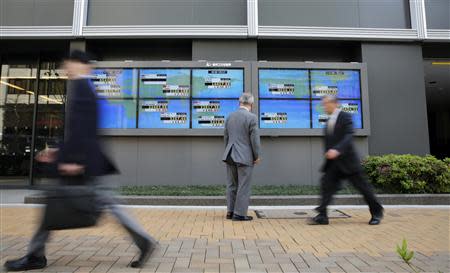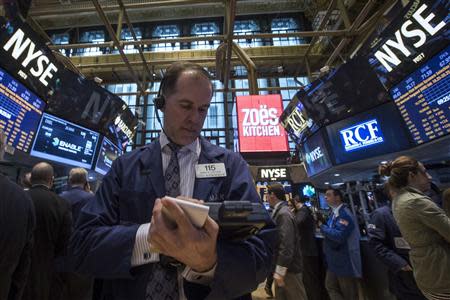Corporate news lifts stocks, tight money markets buoy euro
By Jamie McGeever LONDON (Reuters) - European stocks rose on Tuesday, as optimism surrounding corporate earnings and merger moves eclipsed the crisis in Ukraine, while rising euro zone money market rates and strong German consumer confidence supported the euro. Sterling also rose as investors awaited what are expected to be strong first quarter UK economic growth figures, a view backed by comments on Tuesday from Bank of England governor Mark Carney that the recovery was starting to broaden out. Stock markets shrugged off a mixed session in Asia and remarks made by European Central Bank president Mario Draghi to German lawmakers that further monetary easing in the form of bond-buying remains some way off. But pressure on the ECB to act is mounting. Overnight money market rates rose to their highs of the year as excess cash in the financial system continued to fall thanks to banks paying down cheap ECB loans taken out at the height of the crisis. "Money market developments are putting more pressure on the ECB. If rates don't come down, the ECB is bound to do something," said Jan von Gerich, chief fixed income strategist at Nordea in Helsinki. Overnight money rates in the euro zone nudged 0.4 percent, well above the ECB's benchmark interest rate of 0.25 percent. This helped push the euro up 0.2 percent on the day to $1.3878. Sterling also rose 0.2 percent against the dollar to $1.6840 Draghi and other ECB officials have expressed concern in recent weeks at the deflationary impact of a strong exchange rate. German inflation data later on Tuesday is expected to show an increase in April, ahead of euro zone figures tomorrow which are expected to rise to a still-low 0.8 percent from a multi-year trough of 0.5 percent. Equities drew support from the GfK index of German consumer confidence holding at a multi-year high of 8.5 heading into May, as well as earnings reports from Finnish telecom giant Nokia and Germany's Deutsche Bank . Nokia shares jumped 6 percent after it unveiled plans to return $3.1 billion to shareholders via buybacks and extra dividends, while Deutsche rose 2 percent after profit fell by nearly a third in the first quarter but still managed to beat forecasts. At 03.50 a.m. EDT the FTSE Eurofirst 300 index of leading European shares was up 0.6 percent at 1344 points <.FTEU3> and Germany's DAX <.GDAXI> was up almost 1 percent at 9530 points. Britain's FTSE 100 index <.FTSE> was up 0.5 percent at 6735 points, and France's CAC 40 <.FCHI> up 0.2 percent at 4468 points. In Asia, the MSCI's broadest index of Asia-Pacific shares outside Japan <.MIAPJ0000PUS> fell 0.2 percent. U.S. stock futures pointed to a higher open of 0.2 percent on Wall Street, with M&A fever in pharmaceuticals still the talk of trading floors after Pfizer Inc said it approached AstraZeneca Plc to reignite a potential $100 billion bid. "We seem to reaching a number of M&A milestones, with signs that the volume of large cap M&A deals is now reaching pre-financial crisis levels," wrote Deutsche Bank strategists in a note on Tuesday. Political news from Ukraine continues to unnerve investors, but not enough to divert their cash out of riskier assets like stocks and into safer-haven government bonds. The European Union said on Tuesday it imposed sanctions on 15 Russian political and military leaders, including a deputy prime minister. This followed action from the United States against Russian individuals and firms on Monday. On the economic front, the Federal Reserve begins a two-day policy meeting on Tuesday, which is expected to result in the continued paring back of its bond-buying stimulus. In commodity markets, Brent crude oil was up 0.5 percent at $108.64 a barrel, U.S. crude was up 0.4 percent at $101.22 a barrel and gold was down 0.5 percent at $1,289.80 an ounce. (Reporting by Jamie McGeever and Marius Zaharia; Editing by John Stonestreet;)




